Delicious mid-season cabbage hybrid Krautman f1
The Dutch cabbage hybrid Krautman F1 is valued for its ease of care and high yield. The plant tolerates short-term temperature changes and is resistant to many diseases if the rules of agricultural technology are observed. Let's consider the characteristics and features of growing a hybrid.
Description of cabbage hybrid Krautman F1
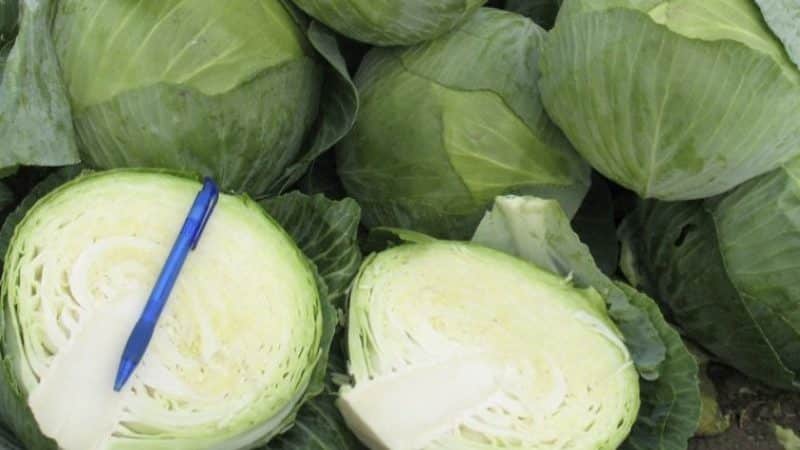
This is a mid-season hybrid of white cabbage, suitable for cultivation in many regions of the Russian Federation.
Krautman was developed by the Dutch company Bejo Zaden. The seeds of the hybrid came to Russia in the late 80s. After variety testing, the hybrid was included in the State Register (in 1993) and began to be used in agriculture. Soon ordinary gardeners also became interested in it, appreciating the ease of care and taste of the heads of cabbage.
Chemical composition and beneficial properties
Krautman cabbage contains 46.2 mg of vitamin C per 100 g, which is involved in the modulation of immunity, the formation of collagen, some neurotransmitters and hormones. Fiber regulates intestinal function, B vitamins speed up metabolism. Beta-carotene maintains visual acuity, and folic acid is involved in protein metabolism and is important for the formation of red blood cells.
Reference. Cabbage is a dietary product containing only 27 kcal per 100 g.
Vitamins PP and U promote healing of small stomach ulcers. Nicotinic acid dilates small blood vessels. Potassium is involved in the conduction of nerve impulses, regulates water and acid balances in the body.Silicon, which is the most abundant in cabbage (100 g contains 177% of the daily requirement), strengthens hair and nails, makes bones strong and blood vessels elastic.
Features of application
Juicy and tender leaves of Krautman cabbage are used in salads, side dishes and soups. Due to the rich content of vitamins, heads of cabbage are salted and fermented without losing their beneficial properties.
Ripening time and yield
Mid-season hybrid. From the moment the first shoots appear until harvest, about 100 days pass, according to the manufacturer, and 120–140 days, according to the domestic register of agricultural crops.
The hybrid has a high yield: 307–926 centners of marketable cabbage are harvested from 1 hectare. From 1 m² you get 7–9 kg.
Resistance to disease and cold
Krautman has strong immunity to most diseases characteristic of cabbage. There is susceptibility to mucous bacteriosis and clubroot.
The hybrid tolerates sudden and short temperature changes well, but plants should not be planted during late spring frosts. Harvesting is carried out before the night temperature drops to +7°C.
Characteristics
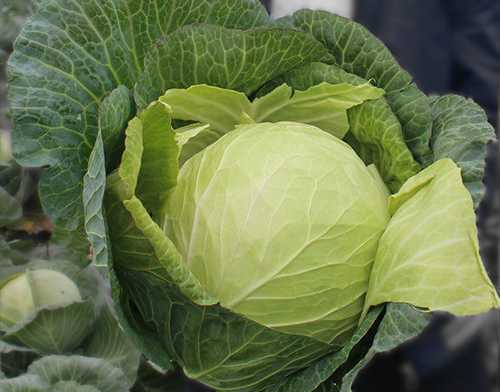
Krautman is a small cabbage with a slightly spreading raised rosette. The leaves are medium-sized, green in color, with a dense waxy coating and small wrinkles, smooth along the edges, without a wave.
The head is dense, weighing from 1 to 4 kg. Due to the high sugar content (4.1% per 100 g), the leaves have a sweet, moderately juicy taste.
What regions is it suitable for?
Krautman is grown in all regions of Russia, except:
- North Caucasian;
- Srednevolzhsky;
- Nizhnevolzhsky.
The hybrid is suitable for Ukraine, Kazakhstan and Moldova. A climate with prolonged rains or severe drought is unsuitable for it.
Advantages and disadvantages
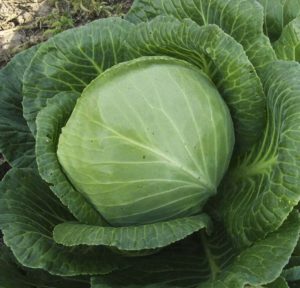
The advantages of a hybrid include:
- resistance of heads of cabbage to cracking and rot;
- delicate foliage without veins and coarsening;
- good transportability;
- strong immunity;
- versatility of crop application;
- simultaneous ripening of heads of cabbage, which allows harvesting using machinery;
- resistance to short-term temperature changes;
- excellent commercial quality and good taste of vegetables.
Disadvantages include:
- demands on watering;
- sensitivity to shadows;
- susceptibility to mucous bacteriosis and clubroot.
Differences from other varieties and hybrids
The main feature of Krautman is his strong immunity to such common diseases as fusarium and vascular bacteriosis. He is not afraid of most pests. Vegetables have a high tasting score - 4.5 points.
Features of planting and growing
Like any cabbage, the Krautman hybrid is grown in two ways: seed and seedling.
Preparing for landing
The area for cabbage must be fertile. Loamy soil with neutral acidity levels (pH 6.2–7.5) is best suited. In the fall, the soil is dug up to a depth of 30 cm and compost is added (about 10 kg per 1 m²). Sprinkle with wood ash and level.
Seed preparation
Seeds from the manufacturer have already been treated with agents to improve germination and protect against diseases. If there are doubts about the quality of the purchase, the seeds are cooled to +2°C (for 24 hours) or soaked in a weak solution of potassium permanganate.
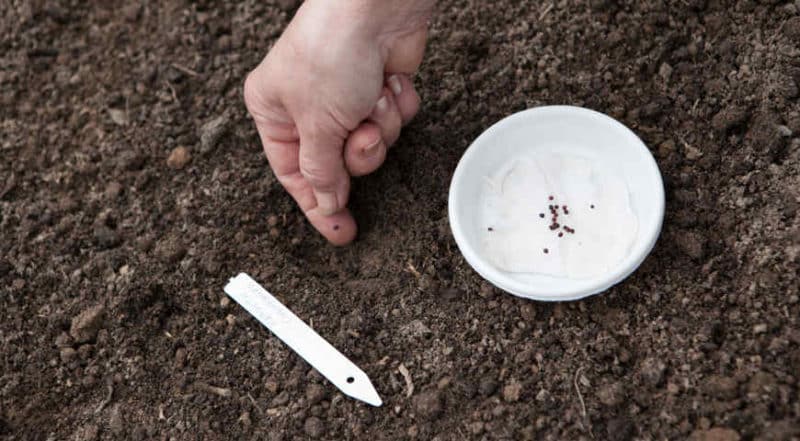
Preparing seedlings
Cabbage is sown in boxes or cups with a volume of up to 200 ml in early April. The seeds are buried 1 cm and lightly sprinkled with soil. The distance between them should not be less than 3 cm. The soil is watered, the container is covered with film and placed in a warm, well-lit place. As soon as the first shoots appear, the film is removed.When planting in boxes, seedlings are picked after the appearance of 2 leaves.
Before planting in open ground, plants are hardened by being in the fresh air. They start with half an hour a day and end with a full day of daylight.
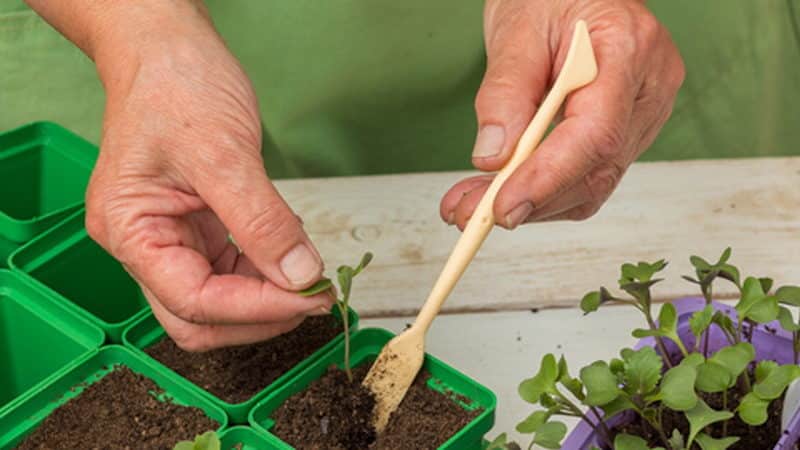
How to plant without seedlings
In the southern regions, a seedless cultivation method is used. The seeds are placed in the soil to a depth of 1 to 1.5 cm. The soil is crushed and watered with warm, settled water. The beds are covered with film or agrofibre until the first shoots appear. The cover is removed daily for 10–15 minutes to ventilate the soil.
Soil requirements
The best soil for cabbage is considered to be a mixture of equal parts garden soil with humus. This will allow for good adaptation of the seedlings. A ready-made mixture with mineral fertilizers is also suitable.
Important! It is better to prepare the soil in the fall so that pathogenic bacteria and pest larvae are destroyed over the winter.
Predecessors
Cabbage is planted after legumes, nightshade, pumpkin and melon crops. Unsuitable predecessors are other cruciferous vegetables (radish, radish, mustard). Cabbage is returned to its original place no earlier than after 4 years.
Dates, scheme and rules of planting
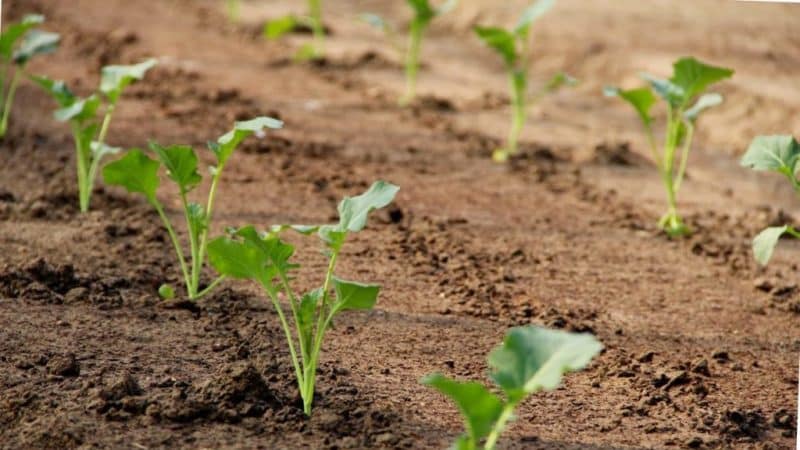
In warm climates, seeds are planted in open ground when the soil warms up to +14°C and the night temperature does not fall below +16°C. In cold regions, seedlings are placed in the garden around mid-to-late May, after the late spring frosts have passed.
3–5 g of urea are poured into each prepared well. The seedlings are lowered into the hole, sprinkled with soil, compacted and watered. Then they are covered with agrofibre so that the plants do not suffer from sunburn. After a few days, the shelter is removed.After planting, the soil around each plant is sprinkled with wood ash to protect against cabbage flea beetle.
Planting density and depth
Seeds are buried 1–1.5 cm, seedlings - to the first leaves. Cabbage does not tolerate shade, so there should be at least 60 cm between plants and 70–80 cm between rows.
Features of cultivation
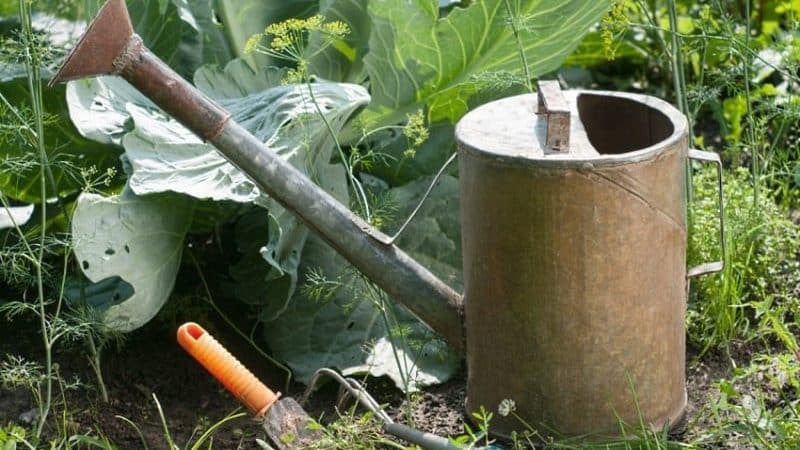
The hybrid is unpretentious, but there are several features caring for it:
- Krautman loves water, but does not tolerate stagnant moisture. Therefore, watering is carried out after the soil has dried, but before it cracks.
- The plant has good immunity, but the prevention of diseases and pests cannot be neglected.
- In dry, hot weather, watering is increased, and the cabbage is covered with straw so that the young leaves are not damaged by the sun.
To get a good cabbage harvest, it is enough to follow basic agricultural practices.
Watering mode
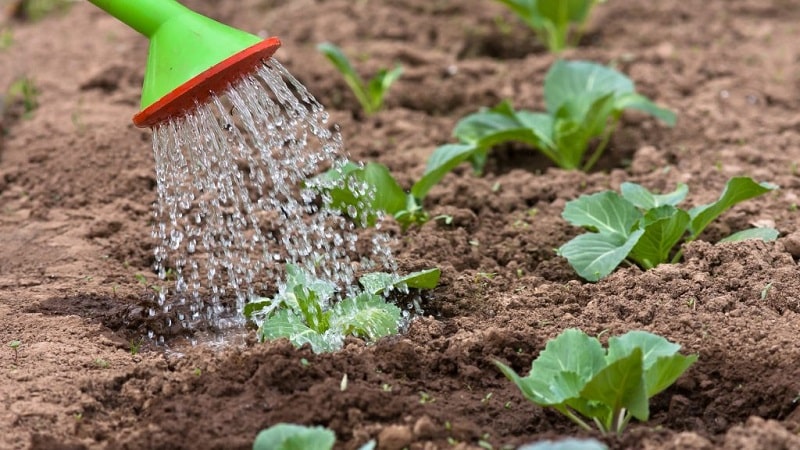
Water Krautman regularly with settled warm water, 1 bucket for every 1 m². Do this twice a week, increasing the amount of water during the formation and development of heads of cabbage. A month before harvest, moisture is gradually reduced, and 2-3 weeks later it is removed completely. This will extend the shelf life of vegetables.
Loosening and hilling
Loosening the soil is required to give the cabbage root system access to oxygen. The procedure protects plants from insect damage. The soil is loosened to a depth of 3–5 cm, removing weeds and debris. Do this before each watering and after precipitation.
Hilling must be carried out twice per season. The first time - after the formation of several large leaves in order to further develop lateral roots, and the second time - after appearance of the ovaryto strengthen the leg. Additional hilling is done every time the stalk is exposed.
Top dressing
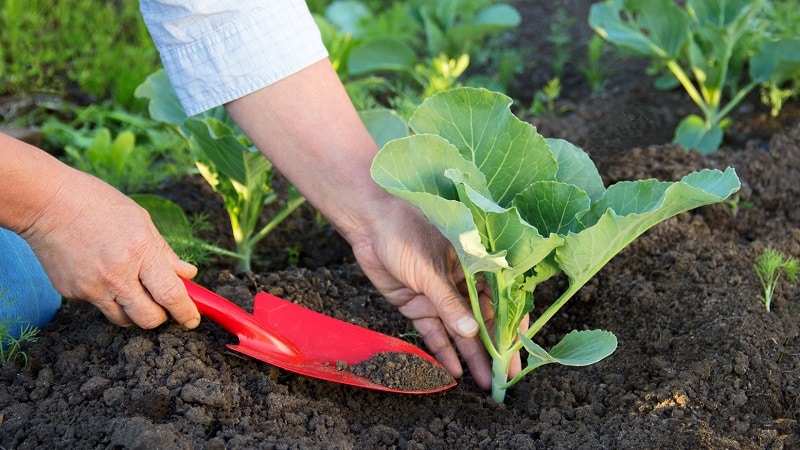
Cabbage requires a lot of nutrients, so feeding must be carried out. The first is carried out 2 weeks after planting the plants in open ground.. Use a solution of mullein (1:8) or bird droppings (1:12). Each seedling takes 0.5 liters.
After 3 weeks the procedure is repeated, increasing the amount of solution for each plant to 1 liter. 5 weeks after planting in open ground, 30 g of superphosphate (for every 10 l) is poured into the solution. Now 1–1.5 liters are poured under the seedling. The procedure is repeated after another 20 days.
Measures to increase yield
Healthy, strong seedlings will give a good harvest, so we must not forget about hardening off the sprouts before planting in the ground.
During the last watering it is recommended fertilize with drugs to increase productivity: “Zdravenem”, “Budon”, “Effekton”. They stimulate the growth of heads of cabbage and concentrate the maximum amount of vitamins and mineral salts in them.
Disease and pest control
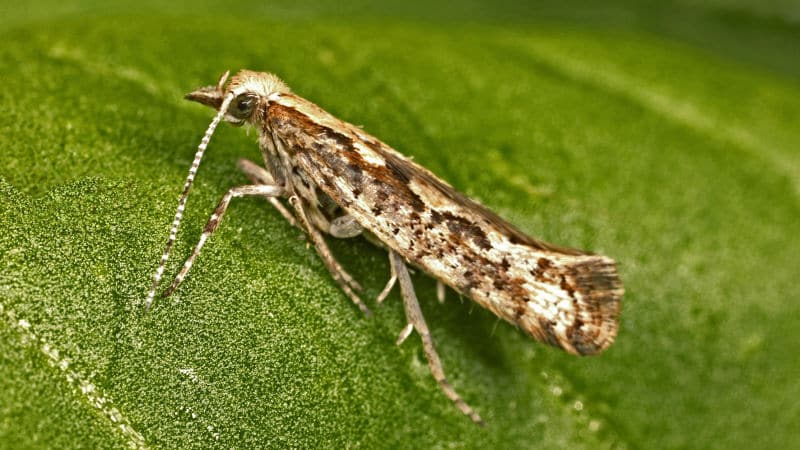
Pests threatening Krautman cabbage:
- cabbage fly;
- cruciferous flea beetle;
- cabbage whites.
Planting dill, marigolds, leeks nearby and treating the soil with wood ash during planting will help protect plants from them.
From diseasesthat can harm this cabbage are dangerous:
- Mucous bacteriosis. To prevent its occurrence, they observe crop rotation and treat plants against pests. The seedlings are sprayed with Planriz (0.3 l/ha).
- Blackleg. Before planting, the sprouts are carefully inspected and infected ones are destroyed. Twice a season the soil is treated with a solution of Bordeaux mixture (1%) and copper sulfate (5 g per 10 liters of water).
- Kila. The affected leaves are removed and the soil is sprinkled with lime.
Treatment of seedlings after their adaptation with Immunocytophyte is encouraged. 1 tablet is crushed and stirred in 2 liters of cold water. The resulting solution is sprayed onto the seedlings.
Difficulties in growing
The harvest is at risk due to the following circumstances:
- the seedlings were waterlogged and a black leg developed;
- there was not enough watering, and the leaves ripened rough and bitter;
- violated the rules for preventing diseases and pests.
Harvest and storage
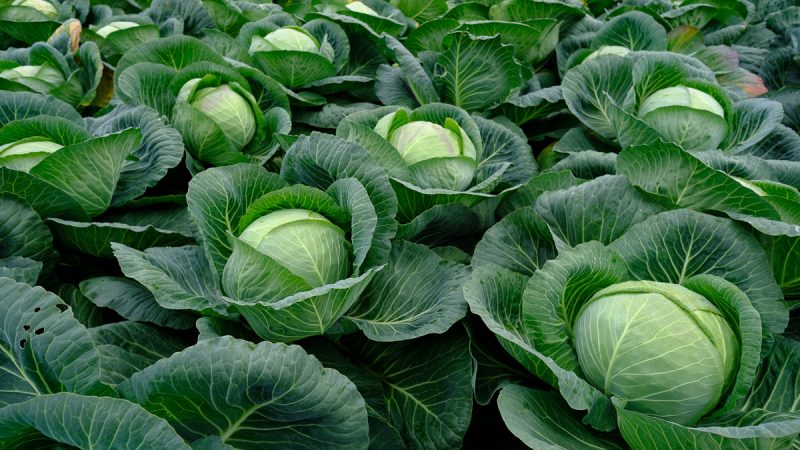
The harvest is harvested in dry, sunny weather using agricultural machinery or by hand. This is done 120–140 days after planting the plants in open ground.
Storage features and keeping quality of the Krautman hybrid
In a room with a temperature of +1...+2°C and high air humidity (90–95%), cabbage is stored until the end of March without loss of taste. Good ventilation and no bright lighting are important.
Tips and reviews from experienced gardeners
Reviews from gardeners about the white cabbage hybrid Krautman F1 are positive. They note the good taste of the vegetables and ease of growing.
Larisa Zhukova, Cherepovets: “I read the description of the Krautman cabbage variety and decided to plant it, but then abandoned it, since the crop suffers from clubroot. Although the vegetables have excellent taste, they are suitable for cooking and for fermenting. The plant is easy to care for."
Oleg Smirnov, Kyiv: “The hybrid’s heads are dense and do not crack even during long-term storage. My cabbage lasts until mid-April. During periods of prolonged rain, I cover the soil with straw, changing it every day. This helps avoid water stagnation at the roots.”
Conclusion
Thanks to its good commercial qualities, high yield and pleasant taste of heads of cabbage, the Krautman F1 cabbage hybrid is popular among summer residents and farmers.By following the basic rules of cultivation and regularly taking measures to combat diseases and pests, it is possible to obtain a rich harvest that lasts until next spring.